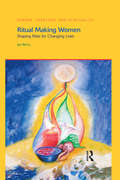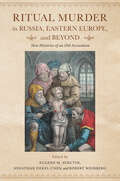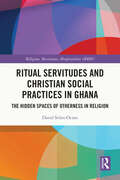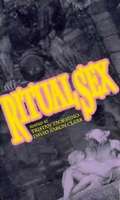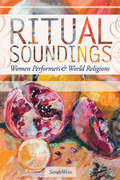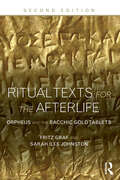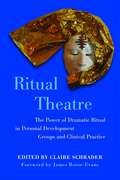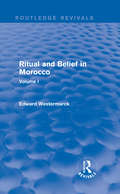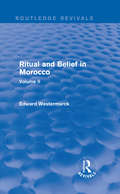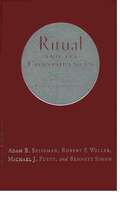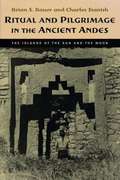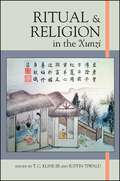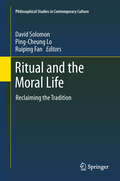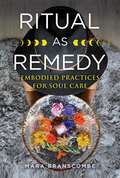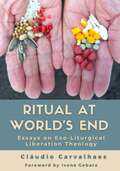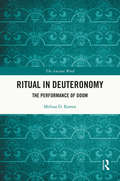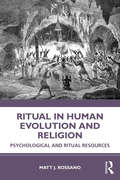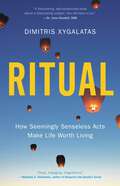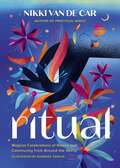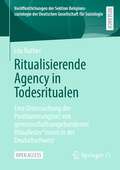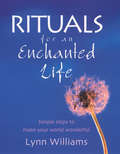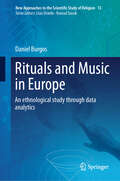- Table View
- List View
Ritual Making Women: Shaping Rites for Changing Lives (Gender, Theology and Spirituality)
by Jan BerryRitual Making Women looks at the way in which women's making of ritual has emerged from the rapidly developing field of women's spirituality and theology. The author uses ethnographic material to explore how the construction of ritual uses story-making and embodied action to empower women. Ritual, far from being a timeless and universal practice, is shown to be a contextual and gendered performance in which women subvert conventional distinctions of private and public. The book combines narrative and case study material and draws on feminist theology and theory, social anthropology and gender studies.
Ritual Murder in Russia, Eastern Europe, and Beyond: New Histories of an Old Accusation
by Eugene M. Avrutin, Jonathan Dekel-Chen and Robert WeinbergA collection of essays exploring the history of an antisemitic accusation that haunted Jewish people in Europe and Russia, and how it spread.This innovative reassessment of ritual murder accusations brings together scholars working in history, folklore, ethnography, and literature. Favoring dynamic explanations of the mechanisms, evolution, popular appeal, and responses to the blood libel, the essays rigorously engage with the larger social and cultural worlds that made these phenomena possible. In doing so, the book helps to explain why blood libel accusations continued to spread in Europe even after modernization seemingly made them obsolete. Drawing on untapped and unconventional historical sources, the collection explores a range of intriguing topics: popular belief and scientific knowledge; the connections between antisemitism, prejudice, and violence; the rule of law versus the power of rumors; the politics of memory; and humanitarian intervention on a global scale.“This important contribution to our understanding of the evolution of ritual murder charges in Eastern Europe brings together a number of innovative studies on the topic, several of which could become standard reading on the subject.” —Glenn Dynner, Sarah Lawrence College“While the topic was not exactly novel to me, I enjoyed reading this book and I was constantly learning from the significant new information and fresh insights from the authors’ analyses.” —Shaul Stampfer, Hebrew University
Ritual Servitudes and Christian Social Practices in Ghana: The Hidden Spaces of Otherness in Religion (Religion, Resistance, Hospitalities)
by David Stiles-OcranThis book explores the kinds of Christian service or diaconia that develop in non-institutionalized practices for supporting survivors of indigenous ritual servitude or Trokosi in Africa. Drawing on empirical research from Ghana, it examines the possibilities of freedom, equality, and dignity for liberated Trokosi and the manner in which these women’s experiences constitute a repudiation of dominant patriarchal family systems. With close attention to the work of indigenous parachurches – which function outside of institutionalized churches – in challenging the contemporary practice of ritual slavery and offering its survivors a lived space in which they need not remain “hidden” as they seek restoration and integration into wider society, Ritual Servitudes and Christian Social Practices in Ghana will appeal to scholars of sociology, theology, and religion with interests in gender, contemporary ministries and African religion.
Ritual Sex
by Tristan Taormino David Aaron ClarkA volume of literary explorations of the many intersections of sex and religion. From personal memoirs of ecstatic revelation, to fictional quests to reconcile sex and spirit, to historical overviews of religion's obsession with regulating the libido, Ritual Sex delves into forbidden areas with gusto, providing an unprecedented look at private life. Includes work by Terence Sellers, Genesis P-Orridge, Pat Califia and many others.
Ritual Sites and Religious Rivalries in Late Roman North Africa
by Lander Shira L.In Ritual Sites and Religious Rivalries in Late Roman North Africa, Lander examines the rhetorical and physical battles for sacred space between practitioners of traditional Roman religion, Christians, and Jews of late Roman North Africa. By analyzing literary along with archaeological evidence, Lander provides a new understanding of ancient notions of ritual space. This regard for ritual sites above other locations rendered the act or mere suggestion of seizing and destroying them powerful weapons in inter-group religious conflicts. Lander demonstrates that the quantity and harshness of discursive and physical attacks on ritual spaces directly correlates to their symbolic value. This heightened valuation reached such a level that rivals were willing to violate conventional Roman norms of property rights to display spatial control. Moreover, Roman Imperial policy eventually appropriated spatial triumphalism as a strategy for negotiating religious conflicts, giving rise to a new form of spatial colonialism that was explicitly religious.
Ritual Soundings: Women Performers and World Religions (New Perspectives on Gender in Music)
by Sarah WeissThe women of communities in Hindu India and Christian Orthodox Finland alike offer lamentations and mockery during wedding rituals. Catholic women of southern Italy perform tarantella on pilgrimages while Muslim Berger girls recite poetry at Moroccan weddings. Around the world, women actively claim agency through performance during such ritual events. These moments, though brief, allow them a rare freedom to move beyond culturally determined boundaries. In Ritual Soundings, Sarah Weiss reads deeply into and across the ethnographic details of multiple studies while offering a robust framework for studying music and world religion. Her meta-ethnography reveals surprising patterns of similarity between unrelated cultures. Deftly blending ethnomusicology, the study of gender in religion, and sacred music studies, she invites ethnomusicologists back into comparative work, offering them encouragement to think across disciplinary boundaries. As Weiss delves into a number of less-studied rituals, she offers a forceful narrative of how women assert agency within institutional religious structures while remaining faithful to the local cultural practices the rituals represent.
Ritual Texts for the Afterlife: Orpheus and the Bacchic Gold Tablets
by Sarah Iles Johnston Fritz GrafFascinating texts written on small gold tablets that were deposited in graves provide a unique source of information about what some Greeks and Romans believed regarding the fate that awaited them after death, and how they could influence it. These texts, dating from the late fifth century BCE to the second century CE, have been part of the scholarly debate on ancient afterlife beliefs since the end of the nineteenth century. Recent finds and analysis of the texts have reshaped our understanding of their purpose and of the perceived afterlife. The tablets belonged to those who had been initiated into the mysteries of Dionysus Bacchius and relied heavily upon myths narrated in poems ascribed to the mythical singer Orpheus. After providing the Greek text and a translation of all the available tablets, the authors analyze their role in the mysteries of Dionysus, and present an outline of the myths concerning the origins of humanity and of the sacred texts that the Greeks ascribed to Orpheus. Related ancient texts are also appended in English translations. Providing the first book-length edition and discussion of these enigmatic texts in English, and their first English translation, this book is essential to the study of ancient Greek religion.
Ritual Theatre
by Edited by Claire SchraderRitual theatre is a powerful healing system that has been practised since ancient times by early societies and in tribal communities. It has the ability to effect deep transformation in its participants, support growth and development, and resolve personal issues. This book considers the relevance of ritual theatre in contemporary life and describes how it is being used as a highly cathartic therapeutic process. With contributions from leading experts in the field of dramatherapy, the book brings together a broad spectrum of approaches to ritual theatre as a healing system. It explores the anthropological and tribal roots of dramatic ritual and proposes that ritual theatre finds its most potent expression in personal development work. The practical application of ritual theatre in various clinical settings is discussed and the final chapters explore the possibilities of ritual theatre as performance. Offering a comprehensive discourse on the theory, application and potential of ritual theatre, this book will be an essential text for all students and practitioners of dramatherapy, arts therapists, psychotherapists, psychologists, counsellors and theatre professionals.
Ritual and Belief in Morocco: Vol. I (Routledge Revivals)
by Edward WestermarckBetween the years of 1898 and 1926, Edward Westermarck spent a total of seven years in Morocco, visiting towns and tribes in different parts of the country, meeting local people and learning about their language and culture; his findings are noted in this two-volume set, first published in 1926. Alongside extensive reference material, including Westermarck’s system of transliteration and a comprehensive list of the tribes and districts mentioned in the text, the chapters discuss such areas as the influences on and relationship between religion and magic in Morocco, the origins of beliefs and practices, curses and witchcraft. This is the first volume of two dealing with the same subject, and will fascinate any student or researcher of anthropology with an interest in the history of ritual, culture and religion in Morocco.
Ritual and Belief in Morocco: Vol. II (Routledge Revivals)
by Edward WestermarckBetween the years of 1898 and 1926, Edward Westermarck spent a total of seven years in Morocco, visiting towns and tribes in different parts of the country, meeting local people and learning about their language and culture; his findings are noted in this two-volume set, first published in 1926. The first volume contains extensive reference material, including Westermarck’s system of transliteration and a comprehensive list of the tribes and districts mentioned in the text. The chapters in this, the second volume, explore such areas as the rites and beliefs connected with the Islamic calendar, agriculture, and childbirth. This title will fascinate any student or researcher of anthropology with an interest in the history of ritual, culture and religion in Morocco.
Ritual and Its Consequences: An Essay On The Limits Of Sincerity
by Adam B. Seligman Bennett Simon Robert P. Weller Michael J. PuettRitual and Pilgrimage in the Ancient Andes: The Islands of the Sun and the Moon
by Charles Stanish Brian S. BauerThe Islands of the Sun and the Moon in Bolivia's Lake Titicaca were two of the most sacred locations in the Inca empire. A pan-Andean belief held that they marked the origin place of the Sun and the Moon, and pilgrims from across the Inca realm made ritual journeys to the sacred shrines there. In this book, Brian Bauer and Charles Stanish explore the extent to which this use of the islands as a pilgrimage center during Inca times was founded on and developed from earlier religious traditions of the Lake Titicaca region. Drawing on a systematic archaeological survey and test excavations in the islands, as well as data from historical texts and ethnography, the authors document a succession of complex polities in the islands from 2000 BC to the time of European contact in the 1530s AD. They uncover significant evidence of pre-Inca ritual use of the islands, which raises the compelling possibility that the religious significance of the islands is of great antiquity. The authors also use these data to address broader anthropological questions on the role of pilgrimage centers in the development of pre-modern states.
Ritual and Religion in the Making of Humanity
by Roy A. RappaportThis book argues that religion can and must be reconciled with science. Combining adaptive and cognitive approaches, it is a comprehensive analysis of religion's evolutionary significance, and its inextricable interdependence with language. It is also a detailed study of religion's main component, ritual, which constructs the conceptions that we take to be religious and therefore central in the making of humanity's adaptation. The text amounts to a manual for effective ritual, illustrated by examples drawn from a range of disciplines.
Ritual and Religion in the Xunzi (SUNY series in Chinese Philosophy and Culture)
by T. C. Kline III; Justin TiwaldXunzi, a founding figure in the Confucian tradition, is one of the world's great philosophers and theorists of religion. For much of the last century, his work has been seen largely as critical of religion, particularly the popular beliefs and invocations of supernatural forces that underpin so many religious rituals. Contributors to this volume challenge this view and offer a more sophisticated picture of Xunzi. He emerges not as critic, but rather as an adherent of religion who seeks to give religious practices meaning even though many religious beliefs are mistaken or self-serving. Each essay offers a powerful illustration of Xunzi as both a religious devotee and as a philosopher of religion, drawing on a wide array of disciplines and methodologies.
Ritual and the Moral Life
by David Solomon Ruiping Fan Ping-Cheung LoIn the twentieth century, in both China and the West, ritual became marginalized in the face of the growth of secularism and individualism. In China, Confucianism and its essentially ritualistic comportment to the world were vigorously suppressed during the Cultural Revolution (1966-1976) under Mao Zedong. But de-ritualization already took place as a result of the Chinese Revolution of 1911 under Sun Yat-Sen. In the West, while the process of de-ritualization has been generally more gradual, it has been nonetheless drastic. In contrast to this situation, this volume investigates the crucial role ritual plays in constituting the human understanding of their place in the cosmos, the purpose of their lives, and imbues human existence with a more complete sense of meaningfulness. This volume presents the work of philosophers from both China and the West as they reflect upon the constitutive role that ritual plays in human life. They reflect not only on ritual in general but also on specific Confucian and Christian appreciations of ritual. This provocative volume is a beacon of warning to Western philosophers, who think they have graduated from the trappings of ritual, and a beacon of hope for Eastern thinkers, who wish to avoid cultural fragmentation. The Editors, both Eastern and Western, have together created a seamless work that not only introduces ritual, but advances an argument for the contribution that ritual makes to cultural renewal. This volume is a work of philosophical thinking about ritual doing, but challenges those who think to realize that the salvation of philosophical thinking rests in the particularity and contingency of ritual doing. Let us hope this volume is widely read, for it points to that which might renew the West. - Jeffrey P. Bishop, Saint Louis University
Ritual as Remedy: Embodied Practices for Soul Care
by Mara Branscombe• Explains how ritual can serve as a way to ground yourself, invite in the new, let go of what needs to be shed, and tap into your own inner powers • Shares ancient and modern rituals, ceremonies, and practices to connect with the seasons, the lunar cycles, and the five elements, as well as open your heart, dance with your shadow self, grow your intuition, and connect with your body • Offers detailed instructions for each ritual, ceremony, and transformative healing practice HEALING BALM for psyche and soul, ritual invokes a unique magic that allows us to step beyond the mundane and touch base with the sacred turning points in our life and the truth of our soul&’s calling. In this evocative guide, Mara Branscombe offers potent soul-care rituals and ceremonies to purify and strengthen minds, hearts, and bodies, so as to enable us to activate our inner power. Connecting with the pagan wheel of the year, the five elements, and the lunar cycle, soulstirring rituals and step-by-step healing protocols show a path towards a deeper, heart-centered living. Transformative practices such as guided meditations and visualizations, breathwork, altar creation, and discovery of our personal empowerment mantras facilitate our healing journey. Ancient and modern ceremonies and specific spiritual formulas help us embody a loving existence, dance with our shadow self, engage with grief, grow our intuition, dismantle limiting beliefs, and heal toxic patterns to find inner strength and peace. Ritual as Remedy is an invitation to shape-shift, heal, transform, and reclaim one&’s true soul purpose through powerful self-care protocols that awaken freedom, joy, and a wild, untamed self-love.
Ritual at World's End: Essays on Eco-Liturgical Liberation Theology
by Cláudio CarvalhaesWith a foreword by Ivone Gebara. "Ritual at World’s End maps Cláudio’s conversion to an ecological approach to liturgy. It also manifests his ever-confident eschewal of the usual authorities in liturgical theology. Instead, he is looking to liberation theologians, and listening to the poor. So, these are the field notes of a man on a journey—to the land, to his past, with his children, for the overlooked—as he wrestles with his questions, privilege, and responsibilities. Passion and urgency, truth-telling and testimony, combine with great force in Cláudio’s thinking, and this remarkable book will be well-read, gather companions, and muster more justice in the life of believers. Read it for it’s challenge, gift, provocation, blessing, agenda-setting, summons…" Stephen Burns Professor of Liturgical and Practical Theology Pilgrim Theological College, University of Divinity Melbourne, Australia
Ritual in Deuteronomy: The Performance of Doom (The Ancient Word)
by Melissa D. RamosRitual in Deuteronomy explores the symbolic world of Deuteronomy’s ritual covenant and curses through a lens of religious studies and anthropology, drawing on previously unexamined Mesopotamian material. This book focuses on the ritual material in Deuteronomy including commands regarding sacrifice, prayer objects, and especially the dramatic ritual enactment of the covenant including curses. The book’s most unique feature is an entirely new comparative study of Deut 27–30 with two ritual texts from Mesopotamia. No studies to date have undertaken a comparison of Deut 27–30 with ancient Near Eastern ritual texts outside of the treaty oath tradition. This fresh comparison illuminates how the ritual life of ancient Israel shaped the literary form of Deuteronomy and concludes that the performance of oaths was a social strategy, addressing contemporary anxieties and reinforcing systems of cultural power. This book offers a fascinating comparative study which will be of interest to undergraduate and graduate students in biblical studies, classical Hebrew, theology, and ancient Near Eastern studies. The book’s more technical aspects will also appeal to scholars of the Pentateuch, Deuteronomy, Biblical Law, Ancient Near Eastern History, Mesopotamian Studies, and Classics.
Ritual in Human Evolution and Religion: Psychological and Ritual Resources
by Matt J. RossanoThis book explores the role of ritual in social life, human evolution, and religion. It explains the functions and purpose of varied rituals across the world by arguing they are mechanisms of ‘resource management’, providing a descriptive tool for understanding rituals and generating predictions about ritual survival. By showing how rituals have resulted from the need to cultivate social resources necessary to sustain cooperative groups, Rossano presents a unique examination of the function of rituals and how they cultivate, mobilize, and direct psychological resources. Rossano examines rituals from a diverse range of historical contexts, including the Greco-Romans, Soviet Russians, and those in ‘crisis cults’. The book shows how rituals address societal and community problems by cultivating three psychological resources – commitment to communal values, goodwill (both of humans and supernatural agents) and social support or social capital. Holding communities together in the face of threat, disaster, or apathy is one of ritual’s primary functions, and the author describes how our ancestors used ritual to become the highly social, inter-dependent primate that is Homo sapiens. Including examples from all over the world and providing detailed descriptions of both past and current ritual practices, this is fascinating reading for students and academics in psychology, sociology, religion, anthropology, and sociology.
Ritual, Heritage and Identity: The Politics of Culture and Performance in a Globalised World
by Christiane BrosiusThis book explores the importance of ritual and ritual theory to discourses of authenticity and originality, thereby deepening our insight into concepts of cultural heritage, identity and nation in a globalised world. The volume is the first interdisciplinary attempt to understand the significance of rituals and related performative traditions in the creation of grounded cultural identities, ‘home’ and heritage as geographically experienceable locations. It assembles perspectives from social and cultural anthropology, performance studies, education and arts that can deal with the politics of revitalisation and preservation of ritualised traditions. While some chapters in this book emphasise on the ritualisation of cultural heritage by concentrating on power relations and politics, as well as actual processes of identification, especially for marginalised ethnic groups or migrant communities, others explore how rituals as intangible heritage are strategically employed by different groups all over the world to make their claims public and to improve and negotiate their position on a local, national or global platform. This book recognises ritualised performances as transnational and cross-cultural phenomena, which are not only tied to and defined via national territories and identities but which also demand new theoretical and methodological approaches towards the discussion of rituals and heritage.
Ritual: How Seemingly Senseless Acts Make Life Worth Living
by Dimitris XygalatasA pioneering anthropologist takes readers on a 'fascinating, well-researched' (Dr. Jane Goodall, DBE) journey through the rich tapestry of human ritual—showing how and why our most irrational behaviors are a key driver of our success." Ritual is one of the oldest, and certainly most enigmatic, threads in the history of human culture. It presents a profound paradox: people ascribe the utmost importance to their rituals, but few can explain why they are so important. Apparently pointless ceremonies pervade every documented society, from handshakes to hexes, hazings to parades. Before we ever learned to farm, we were gathering in giant stone temples to perform elaborate rites and ceremonies. And yet, though rituals exist in every culture and can persist nearly unchanged for centuries, their logic has remained a mystery—until now. In Ritual, pathfinding scientist Dimitris Xygalatas leads us on an enlightening tour through this shadowy realm of human behavior. Armed with cutting-edge technology and drawing on discoveries from a wide range of disciplines, he presents a powerful new perspective on our place in the world. In birthday parties and coronations, in silent prayer, in fire-walks and terrifying rites of passage, in all the bewildering variety of human life, Ritual reveals the deep and subtle mechanisms that bind us together.
Ritual: Magical Celebrations of Nature and Community from Around the World
by Nikki Van De CarFrom the bestselling author of Practical Magic comes an inspiring, illustrated collection of magical celebrations of nature from around the world—with rituals for incorporating them into your own practice. Nature is what gives us life—it is the source of all magic and power in the world. That is something that humans have understood since the beginning of time, and it is a constant among cultures around the world. However, the ways in which we celebrate it can vary wildly. Bulgarian Baba Marta Day welcomes the arrival of Spring with Martenitsas, little talismans of red and white string, while in Southeast Asia, that same yearly event is celebrated during Holi, a joyful, riotous dance of colors. Yalda, Soyal, Saturnalia, Dong Zhi, and St.Lucia's Day (from Iran, Arizona, Ancient Rome, China, and Scandinavia) are all very different—but they all honor the Winter Solstice. Each of these celebrations is a ritual, a form of magic created by community and tradition. And while their differences can help us understand their various cultural identities, their similarities can create a bond that reaches across space and time. In this beautifully illustrated book from bestselling magical author Nikki Van De Car readers will learn the history and meaning behind 40 of these ritual celebrations, organized by season. Each ritual will include suggestions for participating in and appreciating these storied rituals, while honoring their origins and the cultures from which they come.
Ritualisierende Agency in Todesritualen: Eine Untersuchung der Positionierung(en) von gemeinschaftsungebundenen Ritualleiter*innen in der Deutschschweiz (Veröffentlichungen der Sektion Religionssoziologie der Deutschen Gesellschaft für Soziologie)
by Lilo RutherIn diesem Open-Access-Buch werden anhand von ethnographischen Fallbeobachtungen mit16 Ritualleiter*innen folgende Fragen beantwortet Wie positionieren sich Leitende von Todesritualen, die ausserhalb einer religiösen Gemeinschaft in der Deutschschweiz stattfinden? Welches Selbstbild vertreten die Ritualleiter*innen? Welche Aufgaben verbinden sie mit ihrer Tätigkeit? Wem sprechen sie Handlungs- und Wirkmächtigkeit (Agency) zu? Welche Themen und Konzepte sind für ihr Handeln und Erleben zentral? An welche kollektiven Sinngehalte (Deutungsmuster) schließen sie dabei an? Methodisch verortet sich die Arbeit in der Rekonstruktiven Sozialforschung. Dabei orientiert sie sich an Narrationsanalyse, Grounded Theory und Qualitativer Agencyforschung. Theoretisch knüpft die Studie an Konzepte von 'Ritualisierungen' und 'Agency' an, um auf empirischer Grundlage das Konzept der 'Ritualisierenden Agency' zu entwickeln: Durch die gewählten Formen der Ritualisierung im Umgang mit der Bestattung und der Begleitung der Angehörigen erlangen die Akteur*innen eigenständige Handlungsmächtigkeit und Verantwortlichkeit. Die Analysen zeigen, wie die Akteur*innen selbst ihre Handlungsspielräume und ihre eigene Teilhabe in den Interviews und in den Bestattungsritualen zum Ausdruck bringen.
Rituals For An Enchanted Life: Simple steps to make your world wonderful
by Lynn WilliamsMany people are searching for ways to bring richness and meaning back into their lives. Rituals provide powerful tools for doing this, and for facilitating personal transformation and spiritual development. As well as providing opportunities for peace and focus in a busy day, they encourage reconnection with the world around us, and with ourselves. Rituals for an Enchanted Life will help us to energise, connect with, process and release or anchor our thoughts and feelings. They include--Rituals for use at home, creating sanctuaries, attracting positive energies --Ways to create magical places - using altars as personal 'power points'--Empowering rituals for improving relationships, for enhancing or changing them --Ways to release negativity and achieve personal goals--Rituals for use at work, in the office, and throughout the year-
Rituals and Music in Europe: An ethnological study through data analytics (New Approaches to the Scientific Study of Religion #13)
by Daniel BurgosThis book explores modern European religious and non-religious rituals and their main features by focusing on music as a key element required for the full expression of beliefs. It specifically examines the relationship between religious, non-religious, pagan, cultural, celebratory, and traditional rituals. In doing so, this text focuses on the extent to which the rituals overlap, replace, or feed religious or pseudo-religious beliefs to create alternative beliefs (individual or collective) that systematically ignore any religion. The book further analyses the relationship between daily habits, holidays, sports, politics, culture, and other pagan rituals as forms that represent social feelings by identifying, enjoying, or impersonating emotions; and transversally, it explores how music facilitates and fosters those emotions. The volume also investigates how rituals coexist and mutually influence each other through a representation of religious and non-religious rituals, and how music plays a central role in that phenomenology. The author argues that music is a key part of various types of rituals (e.g. rites of passage), and that music supports and enriches the meaning of the ritual, to ultimately strengthen the bond of communication with the individual and the group. This monograph appeals to students and researchers working in religious studies and in music theory.
